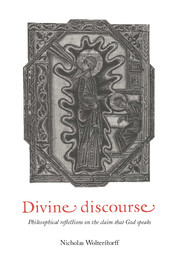Book contents
- Frontmatter
- Contents
- Preface
- 1 Locating our topic
- 2 Speaking is not revealing
- 3 The many modes of discourse
- 4 Divine discourse in the hands of theologians
- 5 What it is to speak
- 6 Could God have and acquire the rights and duties of a speaker?
- 7 Can God cause the events generative of discourse?
- 8 In defense of authorial-discourse interpretation: contra Ricoeur
- 9 In defense of authorial-discourse interpretation: contra Derrida
- 10 Performance interpretation
- 11 Interpreting the mediating human discourse: the first hermeneutic
- 12 Interpreting for the mediated divine discourse: the second hermeneutic
- 13 Has Scripture become a wax nose?
- 14 The illocutionary stance of biblical narrative
- 15 Are we entitled?
- 16 Historical and theological afterword
- Notes
- Index
5 - What it is to speak
Published online by Cambridge University Press: 01 June 2011
- Frontmatter
- Contents
- Preface
- 1 Locating our topic
- 2 Speaking is not revealing
- 3 The many modes of discourse
- 4 Divine discourse in the hands of theologians
- 5 What it is to speak
- 6 Could God have and acquire the rights and duties of a speaker?
- 7 Can God cause the events generative of discourse?
- 8 In defense of authorial-discourse interpretation: contra Ricoeur
- 9 In defense of authorial-discourse interpretation: contra Derrida
- 10 Performance interpretation
- 11 Interpreting the mediating human discourse: the first hermeneutic
- 12 Interpreting for the mediated divine discourse: the second hermeneutic
- 13 Has Scripture become a wax nose?
- 14 The illocutionary stance of biblical narrative
- 15 Are we entitled?
- 16 Historical and theological afterword
- Notes
- Index
Summary
What naturally comes to mind, when we think of performing speech actions, is the picture of someone discoursing by writing down or uttering aloud certain words. We saw in our third chapter that that is a very blinkered view. To answer the question looming before us in this segment of our discussion, viz., whether it is coherent to attribute discourse to God, it was necessary to remove the blinkers and get in view the many modes of discourse.
Now we must reflect on the very nature of speech, of discourse. That will complete the task of showing the difference between speech and revelation. More importantly, nothing short of digging down to the very nature of speech will give us a footing solid enough for addressing the question whether it is coherent to suppose that God speaks.
To say it once more, when I speak of “speaking” (and “discoursing”), I will always have in mind speech actions – that is, actions which can function as what J. L. Austin called illocutionary actions. No doubt ordinary English usage is such that in speaking of “speaking,” one could also have in mind locutionary actions: actions consisting of uttering or inscribing or signing some words. So my usage represents a regimentation of ordinary English.
I shall assume, without argument on this occasion, that performances of speech actions are not, in their nature, a species of exerting influence over someone, nor a species of communicating or expressing one's inner states.
- Type
- Chapter
- Information
- Divine DiscoursePhilosophical Reflections on the Claim that God Speaks, pp. 75 - 94Publisher: Cambridge University PressPrint publication year: 1995



